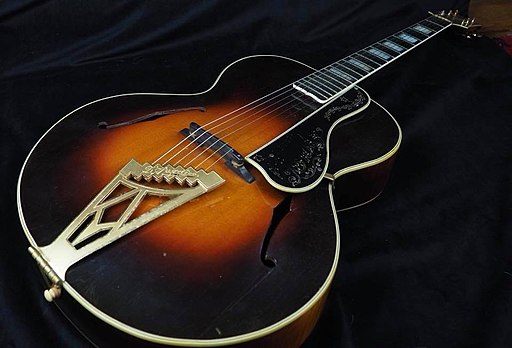.
.
1933 D’Angelico archtop guitar #1034
.
.
.
Intimation of Immortality
…………………………………………For John D ‘Angelico
.
“…let me first do some great thing that shall be told among men hereafter.”
Homer, The Iliad
.
Speak memory—
of the cunning hero
from Little Italy
the archtop carver
the workshop magician
blown off course time and again
he set sail
after he plundered Manhattan’s
sacred heights from Kenmare Street
and
speak memory—
tell the tale of John of the Angels
alone among men
a Stradivarius of sawdust
and great deeds
from Little Italy
how he carved jazz guitars
for Johnny Smith and Barney Kessel and Oscar Moore
and others
with chisel and apron
in the 1930’s and 40’s and 50’s
in New York
taking time with spruce
and maple
and ebony
his sunburst bodies
naked as the nymph Calypso
on whom it was said
no man might gaze
lest he be consumed alive
but
who bore John many children
whose only god was heaven
strung above the city’s roof
whose only hell—
the flame beneath the fretboard of the sea
.
.
___
.
.

John Stupp’s third poetry collection.Pawleys Island.was published in 2017. His manuscript.Summer Job.won the 2017 Cathy Smith Bowers Poetry Prize and was published in August 2018. A chapbook entitled.When Billy Conn Fought Fritzie Zivic.will be published by Red Flag Poetry in 2020. He lives near Pittsburgh, Pennsylvania. From 1975-1985 he worked professionally as a mediocre jazz guitarist.
.
.
Click here to visit the Wikipedia page for the luthier John D’Angelico
.
.
The 1933 D’Angelico archtop guitar pictured above the poem, serial number #1034, was originally owned by Andy Jackson who at the time played with Blanche Calloway and Her Joy Boys and went on to play with the Edgar Hayes Orchestra. (Wikipedia)
.
.
A 1938 recording of “When You and I Were Young,” by the Edgar Hayes Quintet, with Andy Jackson on guitar (presumably playing the guitar pictured)
.
.
.









































Hi John: A very well done poem. I was fortunate to grow up in Kirkwood, M0, where
Mel Bay had his music store. He was my Dad’s age, and I was in high school. John made
several custom made D’Angelico guitars for Mel. He was an international guitar star, and played
all over the world. I bought all of my big band music from Mel, plus my trumpet and upright
bass. Mel was a very friendly guy to me, and encouraged my playing. His main thing, besides
playing guitar, was selling his guitar books all over the world. He had an idea for this,
and made a fortune. Even the Beetles practiced on Mel Bay guitar books. Great poem. Alan!!!!!!
Alan-
Thanks for the encouragement. I began with Mel Bay myself – back then who didn’t haha… God bless him! He spread the gospel.
John
John: Just had a thought. Did you ever play a D’Angelico. I believe even in high school, 1965,
they were out of this world for the price. But Mel Bay ….. could afford them, ha! Thought you
would enjoy that! Best, Alan. My Dad who went to Mel’s store several times, said to me: “I think
Mel still has the first nickel he ever made, still between his thumb and first finger, ha!.
A most lyrical and compelling piece, John. Most enjoyable.
I enjoyed the stop – start rhythm of your poem, John. It reminded me of the Odyssey. And like Homer’s work, it has a classical feel to it
Thank you for this work, and thank you for using my photo to accompany it. It was very enjoyable.
I’m fortunate enough to be the owner of that D’Angelico ex-Andy Jackson. It was quite a chore discovering it’s provenance. I’ve been able to find out anything about Mr. Jackson after about 1940, and the guitar, likewise, has an unknown history for about the following 75 years. When it came to me, it was still in great shape, but had a mix of very old steel and nylon strings someone had tried on it at some point. Fortunately, everything was still intact. I imagine it had been stored somewhere for a very long time. It’s an absolutely wonderful guitar.
As a side note, the recording on the youtube link includes the future legend Kenny Clarke playing the vibraphone.